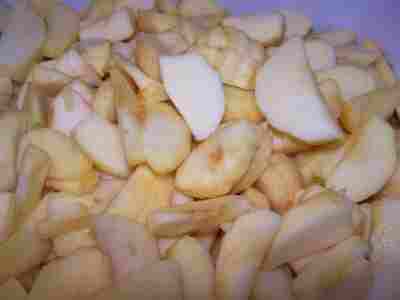
Looking for Apple pie filling: How to Make Homemade Apple Pie Filling to Can or Freeze at Home, Easily and Illustrated! in 2025? Scroll down this page and follow the links. And if you bring home some fruit or vegetables and want to can, freeze, make jam, salsa or pickles, see this page for simple, reliable, illustrated canning, freezing or preserving directions. There are plenty of other related resources, click on the resources dropdown above. If you are having a hard time finding canning lids, I've used these, and they're a great price & ship in 2 days.
If you have questions or feedback, please let me know! There are affiliate links on this page. Read our disclosure policy to learn more.
Apple pie filling: How to Make Homemade Apple Pie Filling to Can or Freeze at Home, Easily and Illustrated!
Canning Apple Pie Filling: How to Make Homemade Canned Apple Pie Filling
Click here for a PDF print version
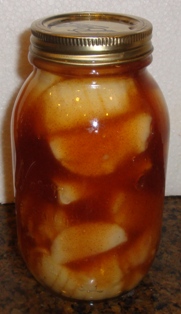 AH,
apple pie filling... If
you have a surplus of apples, and after making applesauce and apple
butter, you want to put up more for the months ahead, then you might
want to make your own home canned apple pie filling Did you think making and canning your own
apple pie filling or jam is
difficult or expensive? Not at all! Here's how to do it, complete instructions in easy steps and
completely illustrated. The apple pie filling will taste so MUCH better than that
over-sugared tasteless glop in the can from the grocery store, and by selecting the right apples, it will be so
naturally-sweet that you won't need to add much sugar.
AH,
apple pie filling... If
you have a surplus of apples, and after making applesauce and apple
butter, you want to put up more for the months ahead, then you might
want to make your own home canned apple pie filling Did you think making and canning your own
apple pie filling or jam is
difficult or expensive? Not at all! Here's how to do it, complete instructions in easy steps and
completely illustrated. The apple pie filling will taste so MUCH better than that
over-sugared tasteless glop in the can from the grocery store, and by selecting the right apples, it will be so
naturally-sweet that you won't need to add much sugar.
Prepared this way, the jars have a shelf life of 18 months to 2 years, and require no special attention. You can also freeze it!
Now here's how you can, too!
Directions for Making Canned Apple Pie Filling
Ingredients and Equipment
Apple Pie Filling Ingredients |
||
| Quantities of Ingredients Needed to make | ||
| 1 Quart | 7 Quarts | |
| Peeled, cored, sliced fresh apples | 3-1/2 cups | 6 quarts |
| Granulated sugar - you may use other sweeteners instead, such as Stevia, honey, Agave, Splenda, etc. See step 8. |
1 cup | 3 cups |
| Corn starch: the USDA recommends a modified cornstarch they
developed:
Clear JelⓇ (dry) - See the box below for where to get it: If you cannot get ClearJel in time, some people use ordinary corn starch and report good results; just not as good as with ClearJel. The USDA insists that ClearJel is much safer than ordinary cornstarch. It's not expensive, so I use it just to be safe. (Note: corn starch is called "corn flour" in the UK) See here for related tools, equipment, supplies on Amazon See here for related tools, equipment, supplies on Amazon If you can't get the Clear-Jel in time to can, then you may want
|
5 tablespoons | 1 cup |
| Cinnamon | 1/2 teaspoon | 1 tablespoon |
| Nutmeg | 1/4 teaspoon | 1 teaspoon |
| Cloves | 1/4 teaspoon | 1 teaspoon |
| Ginger | 1/4 teaspoon | 1 teaspoon |
| Allspice | 1/4 teaspoon | 1 teaspoon |
| Cold Water | 1/2 cup | 2-1/2 cups |
| Apple juice | 3/4 cup | 5 cups |
| Bottled lemon juice | 2 tbsp | 3/4 cup |
Equipment:
- vegetable/apple peeler
- Jar grabber (to pick up the hot jars)
- Lid lifter (I like the lid rack that holds 12 lids or you can pull them out one at a time with the lid-lifter that has a magnet from the almost-boiling water where you sanitize them. ($4 at mall kitchen stores and local "big box" stores, but it's usually cheaper online from our affiliates)t)
- Jar funnel ($4 at mall kitchen stores and local "big box" stores, but it's usually cheaper online from our affiliates)t)
- At least 1 large pot
- Large spoons and ladles,
- Canning jars (often called Ball jars, Mason jars or Kerr jars) (Publix, Kroger, other grocery stores and some "big box" stores carry them - now about $12 per dozen quart jars (up 50% in 2 years!) including the lids and rings)
- 1 water bath canner (a huge pot with a lifting rack to sanitize the jars of apple pie filling after filling (about $30 to $35 at mall kitchen stores and local "big box" stores, but it's usually cheaper online from our affiliates) You CAN use a large pot instead, but the canners are deeper, and have a rack top make lifting the jars out easier. If you plan on canning every year, they're worth the investment.
Recipe and Directions
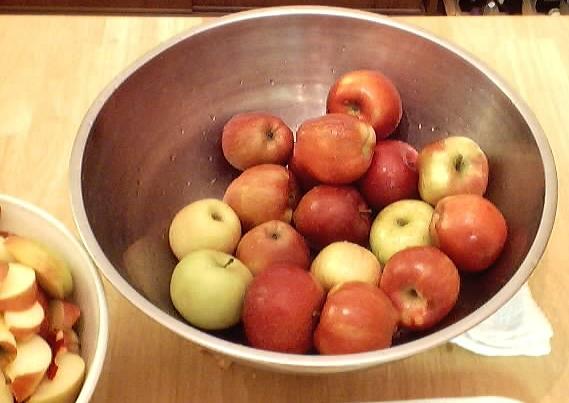 Step 1 - Selecting the apples
Step 1 - Selecting the apples
The most important step! You need apples that are sweet - NOT something like Granny Smith's. Yeah, I know you like them to eat fresh, but you'd have to add a lot of sugar.
Instead, choose apples that are naturally sweet and tart varieties, like: Bramley, Cox Pippin, Fuji, McIntosh, Stayman Winesap, Jonagold, Rome, Cameo, Jonathon. If you can't get any of these, then try Red Delicious, Honeycrisp, etc. You want a flavorful, aromatic and firm apple (Golden Delicious and Galas are too soft, for example). Always use a mixture - never just one type. The Fuji's and Gala's give it an aromatic flavor! Honeycrisp and Pink Lady are also excellent, sweet, flavorful apples.
Step 2 - How many apples and where to get them
You can pick your own, or buy them at the grocery store. You can also get them in large quantities for prices (in 2005) in the $14 to $20 range at the real farmer's markets, like the Atlanta-Forest park Georgia State Farmer's Market and orchards in the southeast of the U.S. You will get about 14 to 18 quarts of apple pie filling per bushel of apples, depending upon bruises and size..
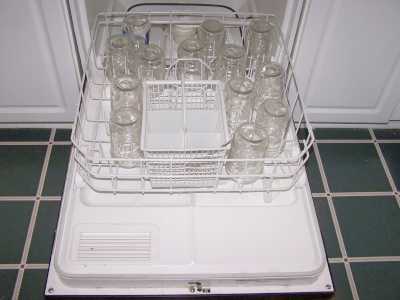 Step 3 - Wash the jars and lids
Step 3 - Wash the jars and lids
Now's a good time to get the jars ready, so you won't be rushed later. The dishwasher is fine for the jars; especially if it has a "sanitize" cycle, the water bath processing will sanitize them as well as the contents! If you don't have a dishwasher with a sanitize cycle, you can wash the containers in hot, soapy water and rinse, then sanitize the jars by boiling them 10 minutes, and keep the jars in hot water until they are used. Leave the jars in the dishwasher on "heated dry" until you are ready to use them. Keeping them hot will prevent the jars from breaking when you fill them with the hot apple pie filling.
Put the lids into a pan of hot, but not quite boiling water (that's what the manufacturer's recommend) for 10 minutes, and use the magnetic "lid lifter wand" to pull them out.
Step 4 -Wash the apples!
I'm sure you can figure out how to wash the apples in plain cold water.
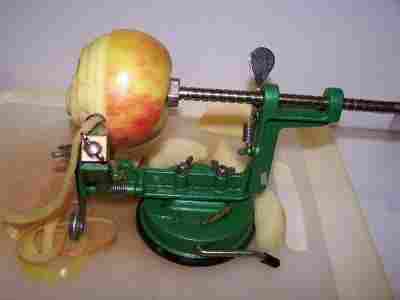 Step 5 - Peel the apples
Step 5 - Peel the apples
The fastest way to peel the apples is one of these peelers! With firm apples, it takes about 20 seconds per apple. These apple peelers don't work well on soft, mushy apples or apples with soft spots on them. In that case your stuck with a hand peeler! But these peelers are SO easy to use, my 3 year old insists on helping... and he does a good job! (see the photo below)
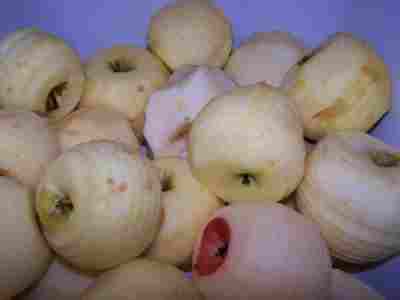 Once
they're peeled, remove any remaining brown spots.
Once
they're peeled, remove any remaining brown spots.These apple peelers work absolutely great on firm apples, pears and potatoes. They don't work so well on apples that are mush or have soft spots. There are 2 types of peelers: those that have a suction base ("Back to Basics", below) and those that clamp on to the edge of a table ("Progressive" below"). I prefer the suction type as you can use it more places. Click on the links below for more info or to order one.
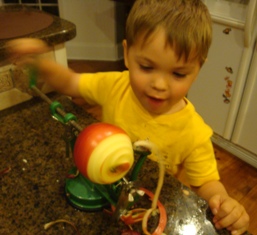 See here for related tools, equipment, supplies on Amazon
See here for related tools, equipment, supplies on Amazon
See here for related tools, equipment, supplies on Amazon
See here for related tools, equipment, supplies on Amazon
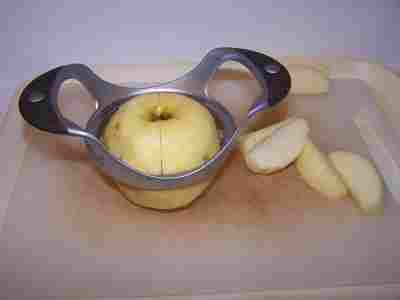 Step 6 - Core and Slice
Step 6 - Core and Slice
You can use a knife, but the $5 corer/slicer you see in the photo is the easiest way to do it. The apple corer/slicer, available at almost any large grocery store, kitchen store, Bed Bath and Beyond, mall kitchen stores, Target and other local "big box" stores
With this or an ordinary knife, any slices that are between 1/4-inch and
1/2 inch thick will do.
Remove seeds, stems, any hard parts near the seeds and brown or soft
spots.
Here are the apple slices, ready for the pie filling!
These corer/slicers are fantastic. Think about it; it makes six slices in the time you can cut one with a knife AND it cores. The one sold here is better than any I've seen in the stores because it has tall handles (so you won't knock your knuckles) and is washable in the dishwasher. Click on the link below for more info or to order one.
See here for related tools, equipment, supplies on Amazon
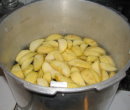 Step 7 - Blanch the Apples
Step 7 - Blanch the Apples
It's pretty simple: place sliced apples at a time in a large pot with at least 1 gallon of boiling water - the larger the pot and the greater the volume of water, the better! Boil each batch 1 minute after the water returns to a boil. You're not really "cooking" the apples - just blanching them. Blanching means heating at high temperature for a brief time to stop the enzymes that can cause the flavor to degrade during storage.
Drain and keep the hot cooked fruit in a covered bowl or pot.
Step 8 - Make the liquid for the filling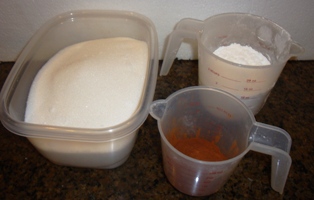
Combine the sugar and cinnamon in a large pot with the apple juice and water. If you don't want to use sugar, see the table below:
Sweetener Options (per quart)
| Type of sweetener | Notes | Amount per 1 quart | Amount per 7 quart batch |
| Stevia | Stevia blends vary a lot in concentration and sweetness - just make it as sweet as you prefer. | 1/3 cup | 3 and 1/3 cups |
| Splenda | 1 cup | 7 cups | |
| Blend (50-50 sugar and Splenda) | 1/2 cup Splenda AND 1/2 cup of sugar | 3 and 1/2 cups Splenda AND 3 and 1/2 cups of sugar | |
| Blend (sugar and Stevia) | 1/4 cup Stevia AND 1/2 cup of sugar | 2 cups Stevia AND 2 cups of sugar | |
| Honey | You need to thin the honey with some normal strength, not undiluted concentrate, fruit juice | 3/4 cup of honey and 1/3 cup of cherry or grape juice | 6 cups of honey and 1 cup of cherry or grape juice |
| Concentrated frozen apple or white grape juice | Use undiluted | 1 cup undiluted concentrated thawed from frozen | 7 cups undiluted concentrated thawed from frozen |
| Agave | 1 cup | 7 cups | |
| Other combinations: Of course, you can use of combinations of agave, fruit juice, honey, sugar and/or Stevia. It will be trial and error to find out what works best for you, as I haven't tested all possible combinations. |
You could use water instead of apple juice.
But best results will come from staying fairly close to the recipe. I've had excellent results using half the amount of sugar and adding other spices (typically some nutmeg and cloves, in addition to the cinnamon).
Step 9 - Heat the liquid
Mix the ClearJel or corn starch with the lemon juice and add this to the juice in the pot. Boil 1 minute on medium heat, stirring constantly, just until it starts to bubble and thicken. Then remove from the heat. It ought to be reasonably thick, but still able to flow.
WARNING: it gets thick really quickly, so don't overcook it, and if you need to add additional fruit juice or water to thin it out enough to be able to fill the jars.
IMPORTANT TIPS: Clear Jel thickens like you wouldn't believe; very fast and very thick. You have to move fast, and not overcook it or it will become too thick. If it does become too thick you can thin it with some water. Just add enough water to make it manageable.
Problem solving:
- If it gets too stiff: To make add a little more apple juice or water, and heat it up again.
- If it is too thin: To make stiffer, just heat and add more Clear JelⓇ and mix
Note: According to the USDA's National Home Food Preservation
Center at the University of Georgia, ClearJelⓇ
is a corn starch that has been modified to give it special and unique
characteristics when used in food products. It is recommended by the USDA for
making pie fillings because it does not break down in the acid food mixtures and
does not thicken enough during heat processing to interfere with the intended
effect of the heat on killing bacteria during canning. In other words it reduces
spoilage and is safer than corn starch. It is preferred for thickening canned
pie fillings as well as other foods over other corn starches because it
has less or no aftertaste, the thickened juices are smooth and clear, and foods
thickened with ClearJelⓇ may be frozen.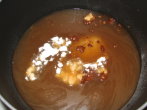
See here for related tools, equipment, supplies on Amazon If you want to freeze the filling instead of can it, just fill your freezer containers (typically ZipLoc bags or plastic containers) or an uncooked apple pie crust, exclude air and seal! then pop it into a deep freeze and ignore the remaining steps below.
Step 10 - Fill the jars with the apple slices and liquid.
As the liquid is now very thick, it won't easily flow, so you need to fill the jars by alternating layers of liquid, then apple slices then liquid, until the jar is full to 1 inch below the top. After each layer I use a spoon, blunt knife or my fingers to press down to fill any air spaces with liquid. A Jar funnel helps. Gently jostle the jar and lightly press the slices to help them settle in the jar and reduce the amount of air space.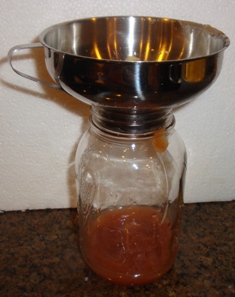
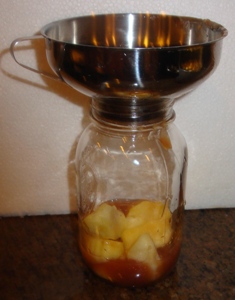
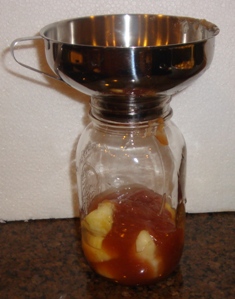
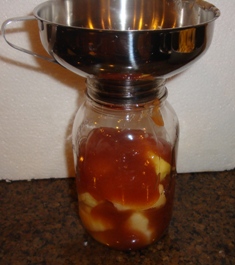
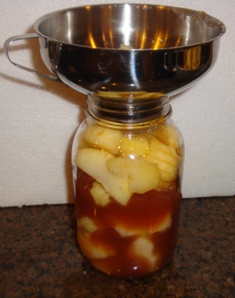
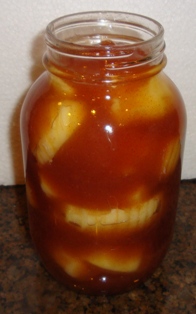 Pack
the jars tightly with apples. If you don't, the apples will float
and the bottom of the jar will be nothing but syrup.
Pack
the jars tightly with apples. If you don't, the apples will float
and the bottom of the jar will be nothing but syrup.
Step 11 - Finish removing air spaces and seal the jars
Fill them to
1 inch of the top, (1 inch of
headspace) and jostle and press the slices down to
fill any obvious air spaces, wipe any spilled apple pie filling of the
top, seat the lid and tighten the ring around them. You will need 1 inch
of headspace if the filling has cooled down (it will expand), and
more like 1/2 inch if it's kept very hot and there are airspaces you
couldn't eliminate.
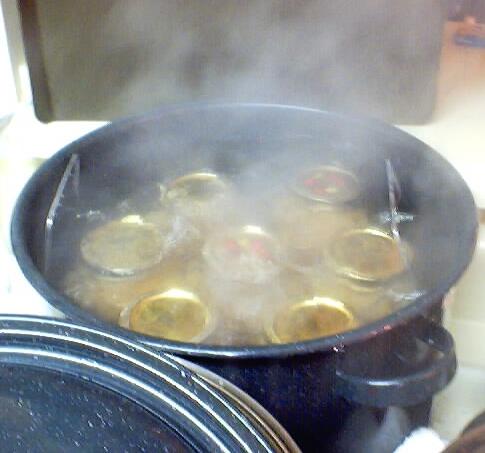 Step
12 - Process the filled jars in the water bath
Step
12 - Process the filled jars in the water bath
Put them in the canner and keep them cover with at least 1 inch of water and boiling. if you are at sea level (up to 1,000 ft) boil pint and/or quart jars for 25 minutes.
If you are at an altitude of 1,000 feet or more, see this chart.
|
USDA-Recommended process time for Hot Pack Pint or Quart Jars of Apple Pie Filling in a boiling-water canner. |
|||
| Process Time at Altitudes of | |||
| 0 - 1,000 ft | 1,001 - 3,000 ft | 3,001 - 6,000 ft | Above 6,000 ft |
| 25 min | 30 | 35 | 40 |
Step 13 - Remove and cool the jars - Done
 Lift the jars out of the water and let them cool without touching or
bumping them in a draft-free place (usually takes overnight) You can then remove the rings if you like, but if you leave them on, at least loosen them quite a bit, so they don't rust in place due to trapped moisture. Once the jars are cool, you can check that they are sealed verifying that the lid has been sucked down. Just press in the center, gently, with your finger. If it pops up and down (often making a popping sound), it is not sealed. If you put the jar in the refrigerator right away, you can still use it. Some people replace the lid and reprocess the jar, then that's a bit iffy. If you heat the contents back up, re-jar them (with a new lid) and the full time in the canner, it's usually ok.
Lift the jars out of the water and let them cool without touching or
bumping them in a draft-free place (usually takes overnight) You can then remove the rings if you like, but if you leave them on, at least loosen them quite a bit, so they don't rust in place due to trapped moisture. Once the jars are cool, you can check that they are sealed verifying that the lid has been sucked down. Just press in the center, gently, with your finger. If it pops up and down (often making a popping sound), it is not sealed. If you put the jar in the refrigerator right away, you can still use it. Some people replace the lid and reprocess the jar, then that's a bit iffy. If you heat the contents back up, re-jar them (with a new lid) and the full time in the canner, it's usually ok.
Making a pie from canned pie filling
So later, how do you use the canned pie filling to make a pie? Easy! Make your crust (see this page), preheat the oven to 425 F. Pour the pie filling into pie crust. Use as little of the liquid as you need, and fill the pie with mostly apples! By minimizing the liquid, that will result in a firmer more appley pie!
Sprinkle with a crumb topping (see this page for the crumb topping) or dough (which ever or none, as you prefer). then cook the pie at 425 F for 10 minutes, then turn the heat down and cook at 375 F for another 45 minutes to 1 hour.
This document was adapted from the "Complete Guide to Home Canning," Agriculture Information Bulletin No. 539, USDA, revised 1994, Reviewed June 2006, Revised November 2008.
Other Equipment:
|
From left to right:
|
Canning kit with Stainless Steel Steam Rack,Canning Funnel, Jar Lifter, Jar Wrench, Lid Lifter, Canning Tongs, Bubble Remover Tool |
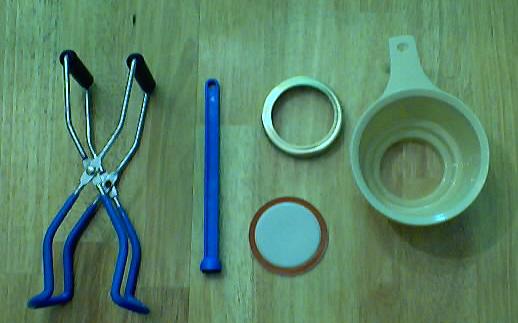 |
Frequently Asked Questions
Q. I've canned apple pie filling in the past and your recipe looked interesting as it did not contain cornstarch and I liked the idea of making the sauce out of apple juice instead of water. Your recipe called for using 2 tablespoons of Clear Jel Starch, which I didn't have on hand so I used 2 tablespoons of Arrowroot instead. 2 tablespoons of thickening agent didn't seem like enough, but I had never worked with Clear Jel so I wasn't sure. In any case, the "sauce" part of my pie filling is too thin. Is Arrowroot not an appropriate substitute or should I have used more? And now I am in a dilemma as well now that the canning is finished (I thought it would perhaps thicken as it cooled). When I use the filling, I can strain the apples and thicken the sauce... how would you suggest I do that? My other question is if it is possible to thicken the sauce of all the jars and re-can them, or would that pose safety concerns? I love to give the filling away as gifts around Thanksgiving, but I could always bake the pies and give those away instead! In any case, if you could assist me with these questions I would be most appreciative!!!! And THANKS for your website... it is a great resource and is now saved as a favorite!!
Arrowroot has different properties; I'm not sure what the exchange rate would be or how well it holds up. The unique aspect of Clear-Jel is that the USDA has tested it in home canning recipes for both quality and safety, so we know it works and is safe.
Of course, with a filling that is too thin, you can always add any starch (corn starch, for example) when the filling is opened to make a pie. You could even just attached a ziplock bag with a little (say 7 tablespoons per quart jar) of starch to each jar for the gifts.
I wouldn't go back and remake the jars that are already sealed. If you open each jar, add starch, heat it up and reprocess the jars with new lids, it would be safe, but that's a lot of work.
Arrowroot: Comments from a visitor on October 09, 2010: "It is important to note that Arrowroot is used as an stabilizer, so will not have the same properties as cornstarch or Clearjel. It is used to stabilize egg whites, to double the volume of egg whites in making meringue."
Q. Lemon Juice: A visitor writes on October 08, 2013: "Hi,
Can you tell me if when making your apple pie filling and other pie
filing recipes for canning if I can leave out the lemon juice? Can
you explain why the recipe calls for it to be added? Thanks so much."
The USDA's National Center for Home Food Preservation says: "If apples lack tartness, use an additional 1/4 cup of lemon juice for each 6 quarts of slices."
So, that indicates to me that it is not absolutely necessary, just if the apples aren't acidic on their own. I would think , with most apples, you could skip it. But, as their note is specific to apples only, I would not skip it for other types of fruit pie fillings.
They do not explain why the lemon juice is added, but certainly it increases safety, and probably helps the thickening.
Comments and Feedback
- Comments from a visitor on August 07, 2012: "Last year we made your apple pie filling and our family just LOVED it. Thank you for making this site for all of us just getting into canning. This has been a real help to me. I plan on using it again this year and expanding my canning experience too. THANK YOU!!! "
Looking for canning equipment and supplies?
Water bath canner with a jar rack
Pressure canners for gas, electric and induction stoves: Presto 23Qt or T-fal 22Qt
Canning scoop (this one is PERFECT)
Ball Blue book (most recent version)
Jars: 8oz canning jars for jams
Find Other types of farms:
Farm markets and roadside stands
Road trips and camping resources
Local Honey, apiaries, beekeepers
Consumer fraud and scams information
Home canning supplies at the best prices on the internet!
Maple Syrup Farms, sugarworks, maple syrup festivals
Environmental information and resources
Farms For Your Event for birthday parties, weddings, receptions, business meetings, retreats, etc.
Festivals - local fruit and vegetable festivals
Get the
most recent version of
the Ball Blue Book
With this Presto 23 quart pressure canner and pressure cooker, you can "can" everything, fruits, vegetables, jams, jellies, salsa, applesauce, pickles, even meats, soups, stews. Model 01781

You can make jams, jellies, can fruit, applesauce, salsa and pickles with water bath canners, like this Granite Ware 12-Piece Canner Kit, Jar Rack, Blancher, Colander and 5 piece Canning Tool Set

